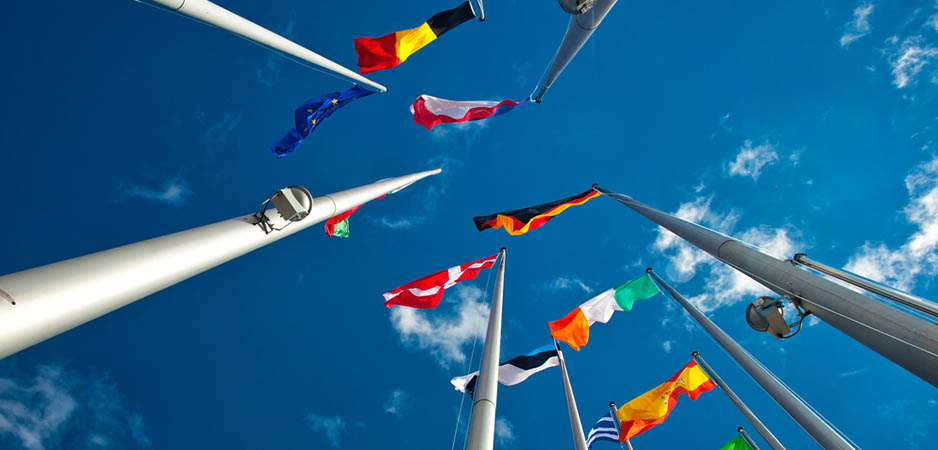In this edition of The Interview, Fair Observer talks to former Belgian Prime Minister Yves Leterme.
In geographical terms, Europe is a continent with an assortment of landscapes, climates and ecosystems. It is an assembly of peninsulas, islands and landforms located in the Northern Hemisphere, bounded by the Arctic Ocean, Atlantic Ocean and the Mediterranean Sea.
The cultural, economic and social diversity of Europe is unparalleled. The continent is home to the biggest trading bloc in the world, the European Union, which contains the Schengen Area of borderless movement. Europe is a popular arrival destination for migrants from the Middle East and Africa, as well as European migrants who cross national boundaries. As of 2017, nearly 4% of EU citizens of working age lived in other member states of the union.
European institutions have transformed the continent into a land of opportunity, cooperation and freedom of choice. EU members now top international indices and rankings in freedom of the press, good governance, human development, religious freedom and economic growth.
Yet the EU faces challenges that are not easy to overcome. The United Kingdom, one of the biggest economies on the planet, will soon leave the bloc. Populism is also on the rise, while unemployment and economic stagnation continue to affect European states.
In this edition of The Interview, Fair Observer talks to former Belgian Prime Minister Yves Leterme about the challenges and opportunities ahead for the European Union. He is currently the secretary-general of the International Institute for Democracy and Electoral Assistance (International IDEA), an intergovernmental organization based in Sweden.
The transcript has been edited for clarity.
Kourosh Ziabari: German Chancellor Angela Merkel announced in October 2018 that she will not seek re-election in 2021. She has dominated European politics for over 13 years. In what ways will Merkel’s retirement affect European politics and, specifically, German-Belgian relations?
Yves Leterme: Angela Merkel has undoubtedly played a very important role for the European Union but also world politics. Her pragmatic leadership, her ability to repeatedly solve both internal and external crisis, and her sturdy commitment not to deviate from traditional Christian Democratic and liberal values such as solidarity, democracy, unity and freedom have made her one of the great leaders of our time. Those same qualities have also been cause for the strongest criticism, not least in her approach to the 2015 migration crisis, of which the repercussions ultimately resulted in a significant decline in support.
There are of course those who worry that without Merkel, Europe and the democratic world have lost one of its [supporting] pillars, who until now was able to withstand storms and major changes on the geopolitical scene. However, the responsibility to defend democracy and our universally agreed values should not rest on Germany’s shoulders alone. I believe it is important that other leaders, but also all of us, rise to the occasion and do our part.
For Belgium, I believe the departure of Angela Merkel will not mark the end of our two countries’ recent history of excellent relations and fruitful collaboration. However, I am convinced that Belgium will aspire to continue on the same path with the new administration of Germany.
Ziabari: Recent figures show that the European Union has experienced a serious decline in fertility rates and that Europe is not a young continent anymore. The major threat to such dynamic economies as Germany is the fact that the population is aging and that families are not willing to have more children. Do you consider the demographic fluctuations in the EU to be a key challenge for the future of the bloc’s economy?
Leterme: Yes, of course I do. Unfortunately, with so many other major issues such as Brexit, terrorism and trade-wars on the EU table, these concerns have not managed to surface up to the top of the debate. But entire welfare systems and ultimately the sustainability of our quality of life in Europe depends on this.
In my opinion, there are three elements to this question.
First, what can we do better so that [birth rates] can be raised? Based on the figures, we can see this problem affects some European countries more than others, so what lessons can be drawn? Why do families in Sweden, Poland and Romania have more children than in Italy, Spain or Greece? Is it purely a question of economy, of job-security and benefits or are there other aspects as well? And what if we were to compare European countries to countries on the Eurasian continent, for example? What role has globalization played in all this? We also need to work together with other countries and regions experiencing similar challenges — China and Japan are just two of these examples.
Second, how can we recalibrate the labor market and pension systems so they are better adapted to current life and health expectancies of the European population? Can we elaborate a “flexicurity” system for pensions where retirement options are more flexible than today? We know that, in the majority of European countries, people live longer with a higher degree of health today than they did when most pension schemes were established. There are 60 to 80-year-olds who happily could and would like to continue working, maybe part-time, whilst there are 55-year-olds who need but can’t afford to retire. We need to move away from rigidity to increased flexibility when it comes to these issues, but also look more concretely at how we can fill the labor market needs we know we will have.
Third, how can our labor markets become more efficient in supplying the demand we have? For example, in the care and service sector but also in highly-skilled jobs in the tech and ICT industry. Do we need to think about retraining our own populations or also reassessing how can make work-related immigration more efficient, attractive and accepted?
Ziabari: In 2013, the Organisation for Economic Co-operation and Development, or OECD, which you worked with as the deputy secretary-general, reported that in 2020, 40% fewer people will join the workforce than will go into retirement. How are EU economies, including Germany, Spain, Italy, Portugal and Greece, going to tackle the issue of labor-force scarcity? Would the easing of immigration laws help them to recruit more educated workers to fill their vacancies?
Leterme: This is exactly the major discrepancy I was talking about. But to me it is not only a question about immigration, but also enabling people to work longer if they can and choose, retrain and reskill our internal populations and especially the ones outside of the labor market, but also offer more fluidity, both in and out of the European labor market system. We also need to be proactive and put measures in place as soon as possible, both when it comes to trying to fill the gaps we know we will have due to the major retirement groups, but also due to the significant changes ahead in the labor market due to technological advancements, automatization and robotization.
We need to be foresighted enough to consider that in 20 to 30 years’ time, our labor markets will demand significantly different kinds of skills and jobs than we have had for the most part of the 20th century. Just think of how self-driving cars will change all jobs related to delivery of people and goods, or how computer programs are increasingly used for previously manual service jobs — cashiers at supermarkets or flight crews helping with check-in. In just a few years, the customer has gotten used to book, pay and check-in without any human intervention, but with the help of software designed by IT developers. This labor market revolution will have as much, if not a greater, impact on societies as the demographic change.
Ziabari: The major part of the 2008-09 financial crisis took place in your first and second governments and also during the term of Herman Van Rompuy. Your country’s biggest banks, Fortis and Dexia, faced severe problems and the value of their stocks plummeted dramatically. You tried to manage the situation through bailout plans and nationalizing the banks. Is Dexia Bank Belgium experiencing better times right now after nationalization? Has the bailout plan helped the economy?
Leterme: The crisis of our banking and financial sector, and later the crisis of the sovereign debt, was the most dangerous one since the Great Depression caused by the 1929 Wall Street Crash. The balances of at least three of our major systemic banks with large retail and investment operations were severely affected by the fact that the underpinning payback-capacity of American borrowers was weakening and led to bankruptcies.
Each bank is based on trust — the trust that clients will not all together at the same time withdraw their savings. Precisely this fundamental trust became a real risk at the end of September 2008 when the general public learned that the bank, where they had their deposits and savings, might not be able to pay them back their money. Closing the banks was not an option. The only possibility, therefore, was to provide sufficient cash that was guaranteed by collaterals offered by the Belgian state.
Once it was clear that Fortis was out of control, I decided to nationalize the bank, since I was not ready to take risks with taxpayers’ money without being able to decide how the bank was managed. These decisions were the only realistic possibility to address the shortage of money, cash as fuel for the banking activities. In the case of Dexia, we decided a capital increase and a special vehicle to phase out the structured, affected, “toxic” assets. I am convinced that the options we chose were the only sustainable ones.
As I pledged 10 years ago, the state will recover all its money and could even make some profit, given the condition imposed by EU authorities and by us — that the guarantees we provided and money we put in the system had to be reimbursed with an additional benefit. By doing so, we made the Belgian economy very resilient. Belgium was one of the first countries on the continent to be severely hit by such a crisis, but it managed to overcome the challenges in some three to four years and without having to impose too important sacrifices onto the average citizens, families and taxpayers.
Ziabari: Do you consider the rise of far-right populism, exclusion of minorities and increased momentum of anti-immigrant rhetoric in some European countries to be a threat to diversity and contradictory to the values upon which European institutions work?
Leterme: The developments you describe are indeed a worrying reality in many European countries. However, even more worrying is the pace of these developments, the inability of the traditional political parties on both sides of the political spectrum to respond to these challenges, and of course the fact that in a global political context this seems to be the trend. At the UN General Assembly in 2018, several opening speeches were by authoritarian leaders, who contrary to the spirit of the United Nations focused on their own agendas rather than the world’s. And this is in a time when multilateralism and international cooperation is needed more than ever to solve the global challenges the world is facing — from climate change to economic inequalities, terrorism and ICT.
It is needless to say that when populist, nationalist, isolationist leaders gain momentum, they offer seemingly simple, quick-fix solutions to these challenges by either focusing on a scapegoat — whether it is in the shape of immigrants, Muslims or Mexicans — or counterproductive but simple solutions, such as increased trade tariffs, walls and harsher migration policies. It is truly astounding to me how so many can be persuaded through these messages, through fear and simplification.
 In Europe, we see similar tendencies and increased lines of conflict and polarization. Whilst many may agree with the key challenges ahead, the way of surmounting these challenges differ significantly. I believe that we have some difficult years ahead where we need pragmatic but also visionary leaders who know their history, who have learned from the past but have the capacity to take the EU into the future.
In Europe, we see similar tendencies and increased lines of conflict and polarization. Whilst many may agree with the key challenges ahead, the way of surmounting these challenges differ significantly. I believe that we have some difficult years ahead where we need pragmatic but also visionary leaders who know their history, who have learned from the past but have the capacity to take the EU into the future.
Ziabari: The European Union seems to have accepted the reality of Brexit, even without a deal. Do you think Brexit will serve the long-term interests of the United Kingdom with all of its costs and benefits and the uncertainty it imposes on the future of Britain?
Leterme: The simple answer is we don’t know. This is the first time a country has exited the EU, and if the expert analyses are correct, it is likely that it is going to have a serious negative impact on the UK economy, especially if no agreement is reached. As a European and as a supporter of the EU project, of course I would have preferred if the UK would have chosen to remain in the EU. The past two years’ discussions have been very difficult for both sides, and have taken a lot of energy and attention from other important topics we need to address on the EU level — climate change, demographic change, inequalities, the labor market, terrorism, ICT. What I would like to see is that if and when Brexit happens, we continue to maintain close and strong ties with the UK, both on the economic but also political level.
The UK remains an important player on the world scene, and although it will be mainly the UK bearing the consequences of Brexit, we also need to be ready to see how we can make the transition as smooth as possible and continue to engage.
Ziabari: Russia recently placed sanctions on senior Ukrainian officials, businesses and cultural figures, including former Prime Minister Yulia Tymoshenko. Ukraine levied sanctions against numerous Russian officials and businesses in 2018. Where do you think the battle between Russia and Ukraine is headed to? Is there anything the European Union can do to alleviate the tensions between the two sides?
Leterme: I want to believe there is always something one can do. Apathy is the worst enemy for progress and development. Nevertheless, the situation is complicated and, in my view, the EU needs to stand firm in its position against Russia with regards to the unlawful acquisition of Crimea, the attacks toward Russian citizens on EU soil, and the infiltration and manipulation of facts, spread of fake news and propaganda. Sanctions are one option of keeping this pressure, as well as a close monitoring and condemnation of all attempts to destabilize Europe or the values it adheres to.
On the other hand, we also need to be prepared to facilitate dialogue in order to alleviate the increased level of conflict between Russia and its neighbors.
Ziabari: The 2019 European Parliament elections could determine the future of Europe after Brexit. Recent polls in France showed that Marine Le Pen’s National Rally has overtaken the centrist party of President Emmanuel Macron. Are you concerned about the upcoming elections? How is the situation in Belgium?
Leterme: I think that at this point in time we need to remind ourselves that polls are just polls and not election results. This said, it is a worrying stock-taking on the general mood in one of EU’s founding nations and one of the oldest democracies. I sincerely hope that by May 2019, the results will be different than the polls.
The situation in Belgium is generally not so worrying as in other countries. The extreme parties, left and right, represented around 14% of the electorate in the last local elections. Of course, we experience populist tendencies, but there is a very pragmatic approach to politics. Belgian citizens are reasonable people.
Ziabari: You’re the secretary-general of one of the world’s prominent organizations that works to promote democracy and good governance. Would you please elaborate on the efforts you have made in less democratic countries, including those of the EU in which democratic institutions are less effective or where democratic values are not fully implemented by governments? How is it practically possible to institutionalize democracy in societies where people grapple with autocratic regimes that violate human rights, suppress civil liberties and freedom of the press?
Leterme: International IDEA, the institute that I’m leading, is indeed the sole intergovernmental organization that only focuses on advancing sustainable democracy. We try to do this by developing and providing cutting edge comparative knowledge products and tools on democratic governance, but also provide support to those working with democracy on the ground. We identify ourselves as a think-and-do tank. Although we have a global reach, we only engage and operate in countries where we are asked to provide assistance and support. This is why we have primarily been active in countries where there is an opening for democratic reforms.
However, this doesn’t mean that we don’t monitor and assess how democracy is faring and the challenges it is facing, both on a global, regional and national level. It is through these assessments that we have also seen the worrying trend of democratic backsliding, especially in Europe. This is when leaders with authoritarian tendencies are democratically elected, and then start dismantling or disempowering democratic institutions from within the system. In those cases, it is important to go to the root of the problem: Were people dissatisfied with the form of governance or rather the lack of delivery, of accountability and the prevalence of corruption?
In these cases, we need to re-establish trust between the electorate and the public authorities, to enable increased transparency, accountability and inclusion. On all these aspects, International IDEA has been working with organizations and public authorities and has developed both knowledge resources and tools to be used on the ground, like the digital party’s portal or the online financial disclosure system for political finance.
In addition, we work with citizen engagement, constitution-building, political party support and anti-corruption. All with the aim of improving the integrity of politics, bridging the gap between citizens and politicians, and restoring trust in the democratic systems.
*[Updated: January 28, 2019.]
The views expressed in this article are the author’s own and do not necessarily reflect Fair Observer’s editorial policy.
Support Fair Observer
We rely on your support for our independence, diversity and quality.
For more than 10 years, Fair Observer has been free, fair and independent. No billionaire owns us, no advertisers control us. We are a reader-supported nonprofit. Unlike many other publications, we keep our content free for readers regardless of where they live or whether they can afford to pay. We have no paywalls and no ads.
In the post-truth era of fake news, echo chambers and filter bubbles, we publish a plurality of perspectives from around the world. Anyone can publish with us, but everyone goes through a rigorous editorial process. So, you get fact-checked, well-reasoned content instead of noise.
We publish 3,000+ voices from 90+ countries. We also conduct education and training programs
on subjects ranging from digital media and journalism to writing and critical thinking. This
doesn’t come cheap. Servers, editors, trainers and web developers cost
money.
Please consider supporting us on a regular basis as a recurring donor or a
sustaining member.
Will you support FO’s journalism?
We rely on your support for our independence, diversity and quality.








Commenting Guidelines
Please read our commenting guidelines before commenting.
1. Be Respectful: Please be polite to the author. Avoid hostility. The whole point of Fair Observer is openness to different perspectives from perspectives from around the world.
2. Comment Thoughtfully: Please be relevant and constructive. We do not allow personal attacks, disinformation or trolling. We will remove hate speech or incitement.
3. Contribute Usefully: Add something of value — a point of view, an argument, a personal experience or a relevant link if you are citing statistics and key facts.
Please agree to the guidelines before proceeding.